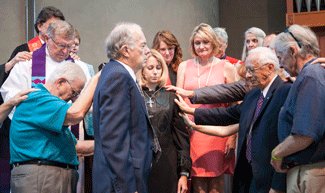 Sunday afternoon I participated in the ordination of Pinnacle’s first seminarian to be called as a pastor, the Reverend Emily Beghin. As I listened to the chancel and bell choirs play, the scriptures being read, and the sermon given, I couldn’t help but think about the people, places and ministries she will touch. This day would change her and a small part of the world forever.
Sunday afternoon I participated in the ordination of Pinnacle’s first seminarian to be called as a pastor, the Reverend Emily Beghin. As I listened to the chancel and bell choirs play, the scriptures being read, and the sermon given, I couldn’t help but think about the people, places and ministries she will touch. This day would change her and a small part of the world forever.
While much of the service is powerful and moving, the part that always touches me is the laying on of hands. The pastor-to-be stands in the middle and all other ordained elders, deacons and pastors lay hands on the newly ordained and pray for her. The weight of all the people who love, support you and care for you give you that last little push into ministry. It was as if they were saying “you have done well good and faithful servant; now go out and do what God has called you to do.”
While most professions don’t have the same kind of ordination into their profession, we all have a sending out. It is the moment when you show up on your first day and say and realize today is the real deal.
What does it mean to be sent out? Jesus says it at the end of Matthew’s Gospel, “Go out and make disciples of all nations…” In this particular case, Jesus was sending us all out as Christians to do His work in the world, and as faithful believers we all are out with this ministry in mind. But what does that look like for the doctor, teacher, fast-food worker, parent, student, retiree, and caregiver?
No matter what your profession, it means the same thing that it means for Emily. It means listening for God’s voice in your work and going where He calls. Where is He calling you? What new projects, adventures or challenges should you take on? And most importantly, listen for God to tell you who you already are.
So often we get caught up in the world of possibilities. We look for what comes next, what we need do to get to the next place and working towards a goal. But a call isn’t something that happens next; it is something that happens now. Your very identity, gifts, skills and person make up who God has called you to be.
Or maybe you feel lost, and wonder if God is calling you at all. Jobs, work and life has changed and you are unsure of where God is calling you now.
No matter where you are, God is calling you; “Good and faithful servant, listen and go where I call because I love you. I have a unique and special purpose for you.”








